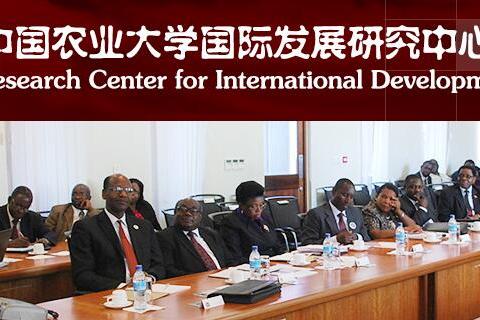中國農業大學國際發展研究中心的前身,中德綜合農業發展中心(CIAD)成立於1988年,1994年原北京農業大學在中德綜合農業發展中心的基礎之上成立了國際農村發展中心。
基本介紹
- 中文名:中國農業大學國際發展研究中心
- 前身:中國農業大學國際發展研究中心
- 立於:1994年
- CIAD:中德綜合農業發展中心
社會背景,機構目標,研究內容,組織管理,
社會背景
近年來,我國與開發中國家的經濟社會以及政治聯繫日益緊密,對外援助逐年增加,影響力日益加大,中國企業在非洲、拉丁美洲以及亞太地區的投資急速上升。中國已經成為影響非洲、拉美和亞太地區發展的中堅力量。
中國農業大學國際發展研究中心的前身,中德綜合農業發展中心(CIAD)成立於1988年,1994年原北京農業大學在中德綜合農業發展中心的基礎之上成立了國際農村發展中心。從上世紀90年代開始,國際農村發展中心先後作為世界銀行、亞洲開發銀行、德國技術合作公司、歐盟、德國復興發展銀行、日本國際協力組織、日本協力銀行、澳大利亞國際發展署、紐西蘭國際發展署、英國國際發展部等國際組織的主要技術支撐機構,並為這些組織在我國的發展援助提供技術服務。與此同時,國際農村發展中心受商務部、農業部、水利部、國務院扶貧辦以及雲南、廣西、甘肅、陝西、寧夏、遼寧、西藏、貴州、四川等西部省區委託,管理和執行大量的國際發展項目。在過去的二十多年中,培養了一批熟悉國際發展實踐業務的專門人才,成為了在國內唯一的專業型的、具有系統國際發展實踐能力的發展機構。1998年,國際農村發展中心轉型成為農村發展學院,同時建立了國內第一個發展專業的本科教育體系。2002年,農村發展學院與人文學院合併,成為人文與發展學院。學院從2008年開始開設發展研究方向的國際碩士、博士留學生課程,成為國內第一個發展專業的留學生項目。在建立國際發展教育體系的同時,國際發展的研究工作在近年來取得了長足的進展,有關中國發展模式的研究、中非發展與減貧的對比研究、中非農業的發展研究、中國南亞的發展減貧對比研究、國際發展援助研究等方面的工作已經在國內形成特色,並正在成為在國內領先的以開發中國家的發展問題為特色的研究體系。這些研究工作得到了外交部、商務部、國家開發銀行、國務院扶貧辦、農業部等各部委以及世界銀行、亞洲開發銀行、OECD等國際組織的高度重視。與此同時,在開發中國家的發展實踐也相繼展開。
為了解決其它開發中國家對中國發展經驗和教訓日益增長的學習需求,以及不斷增長的中國和其他發展工作者們在國際發展合作方面的交流需求,特別是為了更好的探討中國的國際發展合作如何有效地實施,學校在學院前期工作的基礎上成立了國際發展研究中心(RCID)。
機構目標
國際發展研究中心旨在運用中國視角探討國際發展問題;為廣大學者、決策層、實踐工作者提供一個分享國際發展領域相關理論與實踐知識以及最新的國際發展動態的開放的平台。其主要任務側重於:
--在全球發展背景下,運用比較分析的方法深入探討中國的發展轉型問題;
--將其他發展工作者在國際發展領域中獲得的經驗和教訓介紹給中國的學界和政策界,達成共識,並共同致力於減少全球貧困,實現可持續發展;
--研究中國對外援助政策與實踐,並將成果傳達給國際發展社會,提出有關中國國際發展的政策建議;
--參加中國在其它發展國家的國際發展項目,為進一步的研究積累實踐經驗;
研究內容
國際發展研究中心在變化的全球政治背景和經濟體系中進行以下研究:
--中國轉型的國際意義
研究的重點是理解中國快速轉型的性質和國際意義。本研究首先通過實證研究探討中國轉型過程,並通過批判性分析討論轉型的涵義。該研究將有助於為當前的發展研究問題提供參考。
--中國的國際發展合作:有效性以及與國際發展架構的連線
研究旨在了解中國的對外援助,主要包括操作過程、管理和影響;同時也試圖探究中國的以南南合作為基礎的國際發展框架如何成為OECD-DAC成員國以南北關係為基礎的方式的補充。
--中國在非洲發展中的角色
研究重點在於從發展研究視角看中國在非洲發展中的作用。研究內容涵蓋中國的對外援助、在非洲的政府投資和私人投資情況。特別是要從理論上理解在如此紛亂的資本主義擴張背景下,中國在非洲影響的性質,以及這種影響對於非洲發展過程的影響。
--改變發展援助角色:從干預者到相互學習
國際發展研究中心在進行國際發展實踐的同時,試圖探索與過去的國際捐助的“中間人”不同的角色,即在發展實踐基礎上與合作夥伴相互學習。這一行動研究來自當地合作夥伴、中國官方援助機構、非政府組織以及企業合作等多方支持。
組織管理
國際發展研究中心是中國農業大學兩個重點社會科學研究中心之一,為學校直屬研究機構,掛靠人文與發展學院。國際發展研究中心聘請國內外在國際發展領域知名的專家組成國際發展研究院的諮詢委員會。
Knowledge, Policy and Practice in International Development
Research Center for International Development at China Agricultural University
History
The Research Center for International Development (RCID) was built on the formative constructs cultivated through a long period of engagement in international development intervention in China and abroad by the Center for Integrated Agriculture Development (CIAD), and later the COHD.
CIAD at China Agricultural University (CAU), which laid the groundwork for the later formation of the College of Humanities and Development Studies (COHD) and the Research Center for International Development (RCID), was jointly establishedby the governments of China and Germany and brought to maturity through the technical support of the German Agency for Technical Cooperation (GTZ). Since its establishment, the CIAD has undergone a systematic transformation from a donor-supported and action-oriented institute for development intervention, to a leading institute focusing on a combination of research, education and practical execution as they apply to developmental studies. The curriculum for Developmental Studies designed by the COHD for use with Chinese and international students alike (from undergraduate to PhD-level education) is entirely unique in China. Furthermore, the wealth of research that the COHD has conducted on poverty and rural transformation—in particular as they relate to often overlooked members of the population, participation, gender, and critical development thinking, etc.—has gained a great deal of academic and administrative attention in China.
The original purpose of this long-term engagement was to strengthen the university’s academic capacity to understand China’s role in international developmental policy from a Chinese perspective. Based on the knowledge garnered thereof, the RCID was then established to further address three aspects of international development: the increasing demand to use China’s developmental experience to form a practical roadmap for other developing countries; the increasing demand for exchange and developmental cooperation between China and other developing countries; and most importantly, to explore how China’s cooperation in international development can be undertaken effectively. With these three focal points, the RCID was created by CAU to serve as one of its two key social science research centers that specialize in international developmental studies.
Mission
The RCID’s mission is to generate and disseminate knowledge, as well as to inspire and inform policy makers of practices in international development from a Chinese perspective. The research center will be an open platform for scholars, policy makers and practitioners to share knowledge and information, and engage inau courantdebates on international development.
In particular, the RCID focuses on:
- Understanding China’s developmental transformation within the context of global development, gleaned through comprehensive comparative analyses;
- Compiling the experience and lessons acquired from other key players in international development, and introducing relevant information to China’s academic and administrative communities with the goal of fostering common understanding and making a joint effort to reduce global poverty and attain sustainable development;
- Studying China’s foreign aid policy and practices to foster a more informed understanding among members of the international development community, and helping the Chinese government to improve its international developmental policy;
- Taking part in China’s international development program in other developing countries to gain practical experience for research.
Research Program
RCID conducts the following research within the context of changing political and economic structures around the globe:
- China’s Transformation: International Implications
This research focuses on understanding the nature of China’s rapid transformation and the international implications thereof. Theoretically, the purpose of research in this field is primarily to garner a more thorough understanding of these topics through empirical studies and critical analyses that will to contribute to current debates on new developmental studies.
- China’s Cooperation in International Development: Effectiveness and Connection to International Developmental Architecture
This research focuses on understanding China’s foreign aid, particularly its operations, management and impact. The research will also explore how China’s South-South Cooperation-based international development framework can be complementary to the North-South-based approach applied by the members of the OECD’s Development Assistance Committee (DAC).
- China’s Role in African Development
This research focuses on the role that China plays in African development from a developmental studies’ perspective. The research covers China’s foreign aid, state investment and private investment in Africa. In particular, research in this field will focus on fostering a more in-depth understanding of the nature of China’s role within the context of entangled capitalist expansion in Africa, as well as the impact of this role on African developmental processes.
- Creating Innovative, Alternative Developmental Cooperation: Intervention and Education
While engaging in international development, the RCID continues to explore a role that is not limited to that of a “middleman” in international donation-related affairs, but that focuses on cooperating with partners in developing countries to test developmental practices based on mutual learning. This action-oriented research is undertaken jointly with local partners under the support of numerous official aid agencies in China, NGOs, and businesses.
Organization and management
The RCID, which operates within the COHD structure, is one of two key social science research centers at China Agricultural University. It is overseen, staffed, and fully financed by the university.
An international advisory group composed of five international and five domestic experts supervises the center’s program and helps expand the center as an independent and sound research-based institute for international development.

